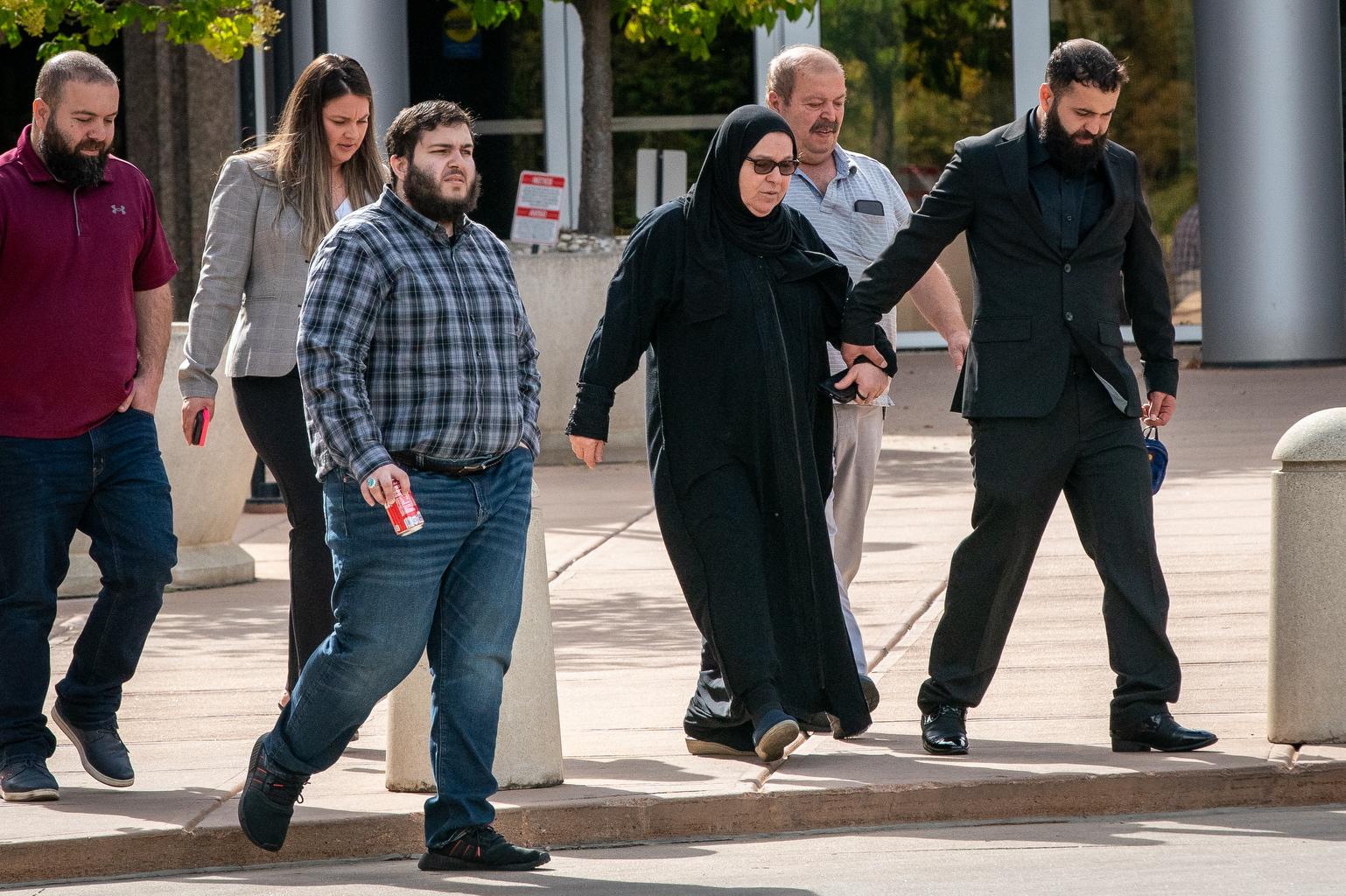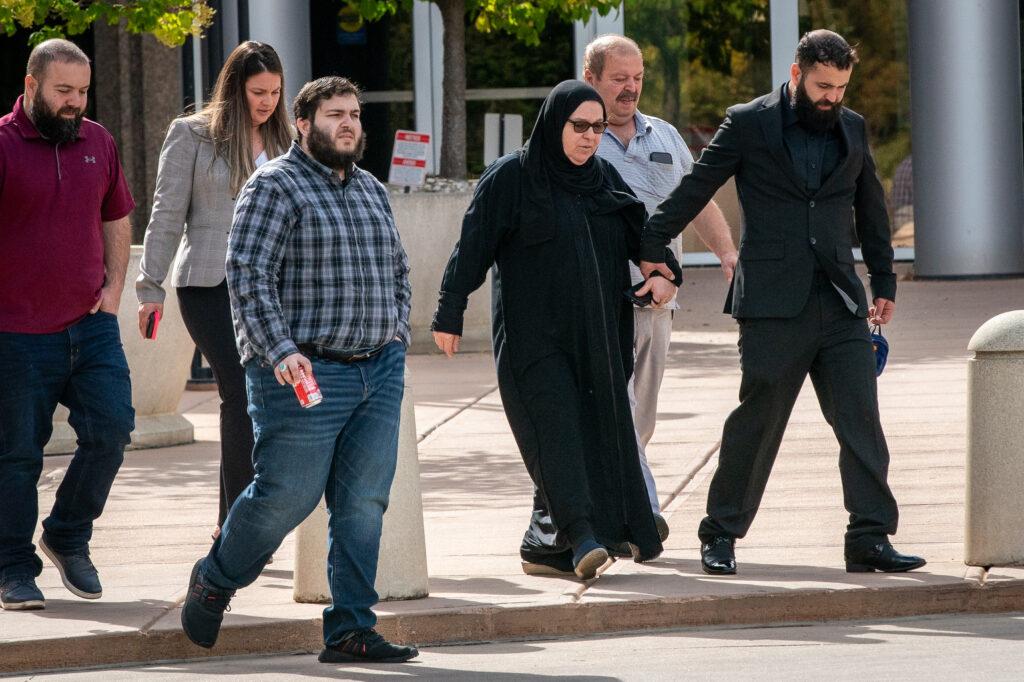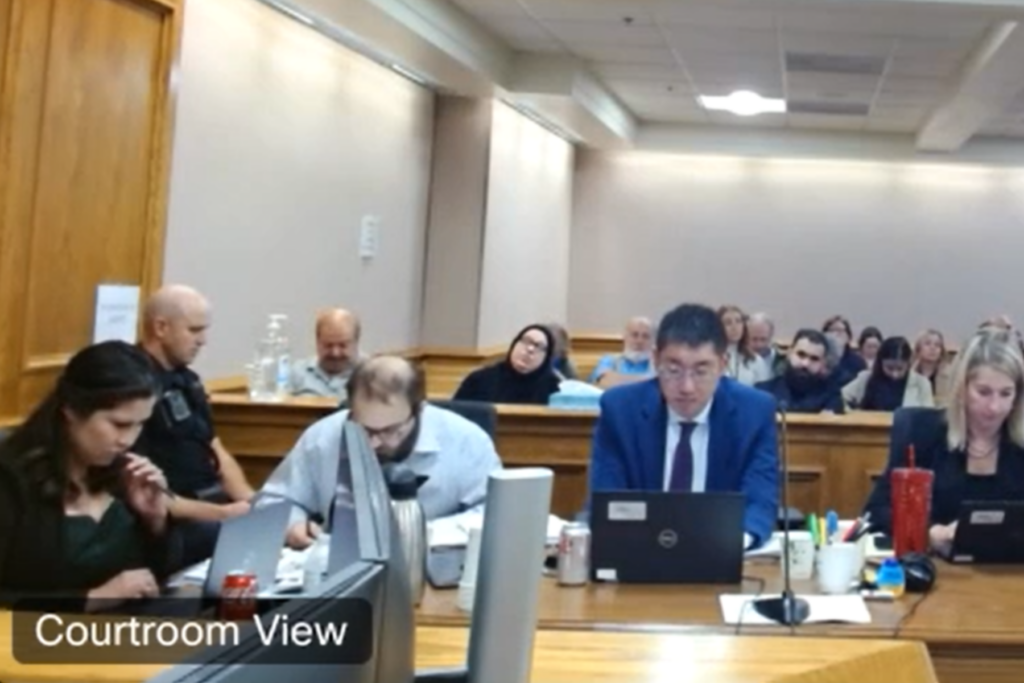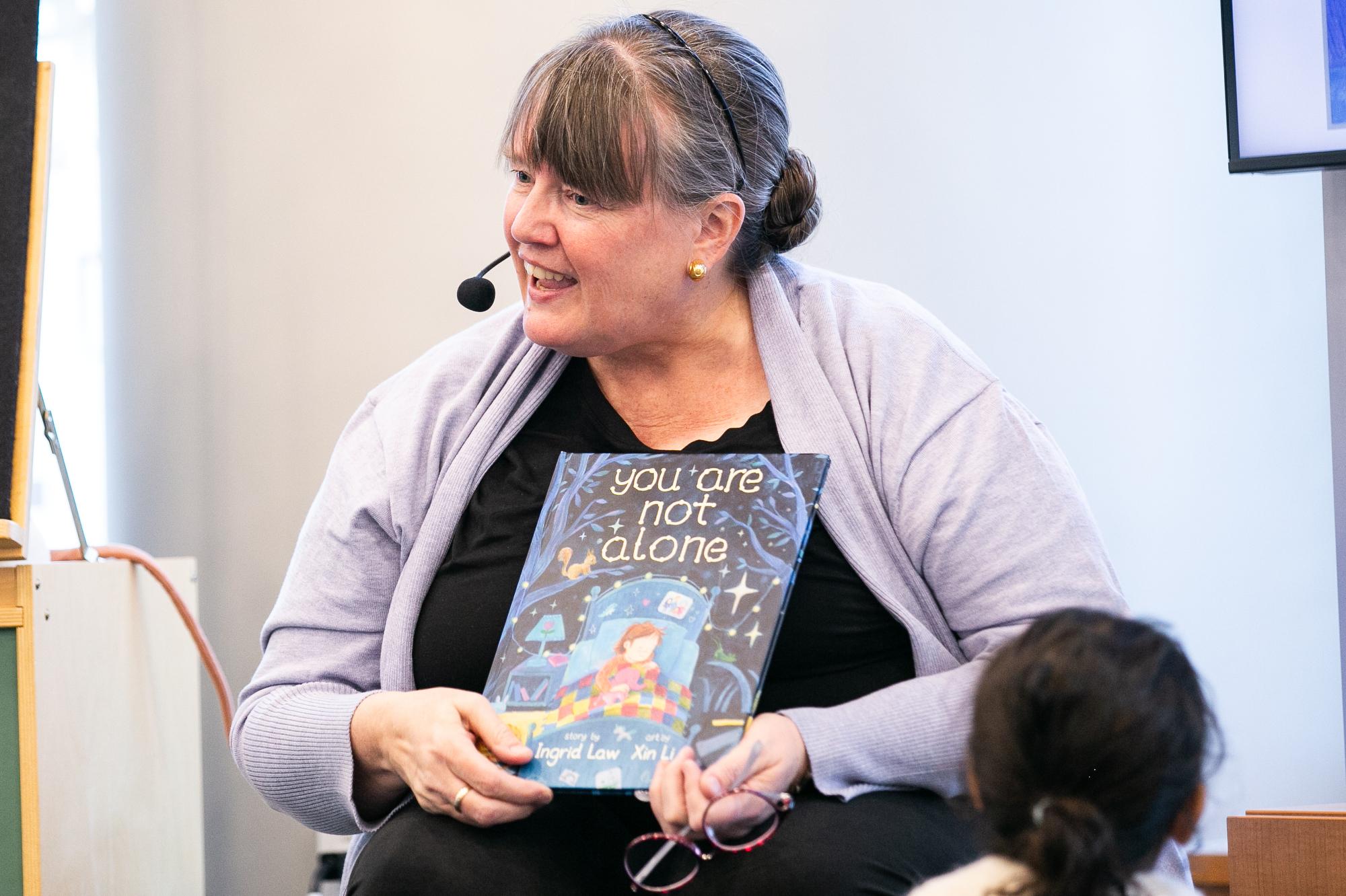
CPR is covering the King Soopers shooting trial. You can read our explainer of the case here. You can read previous coverage of the case here.
In a packed courtroom full of victims, media and law enforcement, the prosecution and defense presented closing arguments Friday in the trial of the man accused of the 2021 shooting at a Boulder grocery store. The suspect, 25-year-old Ahmad Alissa, faces 55 felony charges and is accused of killing 10 people on March 22, 2021.
During closing arguments, prosecutors painted a sweeping portrait of Alissa — a schizophrenic man — who starting in early 2021, had a blossoming obsession with mass shooters and built an arsenal of weapons in his family’s home with hopes of killing as many people as possible in one setting.
Assistant Boulder District Attorney Ken Kupfner quoted what Alissa told doctors: "I didn't commit the attack in January. Didn't commit the attack in February … because I was still practicing, and wasn't ready. By March I had enough practice."
Then, after dropping his brother off at work in Arvada, he drove to a bustling King Soopers at 2:30 p.m. nestled in a busy strip mall in Boulder.
He parked carefully, got weapons out of his car and killed three people in the parking lot — specifically people who were running away from him.
Then he went into the store and killed another seven people, also seemingly targeting people trying to get away. He then shot and killed a Boulder police officer, before surrendering to police.
The prosecution stressed that up to the attack and the day of, Alissa knew right from wrong and was not insane.
“He's functioning in his daily life. He's paying his bills, he's going to the gun stores and completing all the forms,” Boulder District Attorney Michael Dougherty said on Friday. “... He's driving to work and he's dropping others off at the restaurant and he's working as a cook at a restaurant.”
Alissa pleaded not guilty by reason of insanity.
This means the jury will decide whether defense attorneys successfully convinced him that he met the state definition of insanity on the day of the shooting or whether he is just plain guilty.
The jury was sent to deliberate around 2:30 p.m. Friday.
Those killed in the shooting were Denny Stong, 20; Neven Stanisic, 23; Rikki Olds, 25; Tralona Bartkowiak, 49; Teri Leiker, 51; Eric Talley, 51; Suzanne Fountain, 59; Kevin Mahoney, 61; Lynn Murray, 62; and Jody Waters, 65.
This decision could dramatically alter the length of time that he is in custody and change the course of his young life
In order to be found not guilty by reason of insanity, a person must be “so diseased or defective in mind” that at the time of the crime, they were incapable of distinguishing right from wrong.
Or, they could be found not guilty by reason of insanity if they were incapable of forming a “culpable mental state” that is essential to the crime charged.
During their presentation to the jury, defense attorneys say Alissa was increasingly burdened by his mental illness, showing signs of isolation, bad hygiene and paranoia in the year before the shooting.
“Insanity is the only explanation for this tragedy,” Defense Attorney Kathryn Herold told the jury Friday during a sometimes impassioned delivery. “... A verdict of not guilty by reason of insanity is not saying he's innocent. You're not saying he's getting away with it. What you are saying is that his mental illness, his schizophrenia, prevented him from knowing right from wrong.”
They say, that due to cultural and other family barriers, no one encouraged him to get help, even though he lived in a nine-person, multi-generational home. The defense also argued that the voices in his head — untreated by medication or therapy — eventually grew loud enough to inspire the mass shooting.
“What we know is that Mr. Alissa committed these crimes because he was psychotic and delusional on March 22, 2021,” Herold said. “His mind was drowned in his illness, drowning in the voices.”
In a clip that Herold played for the jury, Alissa is seen telling psychologists, “I started hearing voices, those killing voices… I thought if I committed a mass shooting the voices would go away.”
At one point, Herold yelled at the top of her lungs to try to convince the jury the severe illness of Alissa’s mind.
“Voices are killing voices. Kill, kill, kill, kill, kill.” she screamed in the courtroom
The defense also used statements from Dr. Loandra Torres’s testimony — one of the psychologists who evaluated Alissa multiple times at the state mental health hospital — to argue that Alissa “did not know right from wrong” and he was “psychotic and delusional” at the time of the shooting.
Herold argued that psychologists have no way of understanding where Alissa’s mind was during the shooting, “because it was so insane”.
“Mr. Alissa has been at the state hospital for three years because he's so sick, he's so mentally ill,” Herold said. “He's put on the most potent antipsychotic and still exhibiting significant symptoms.”
But over three weeks, prosecutors worked to build a case that Alissa intended to do what he was accused of doing
“Mass shootings by the very nature are extremely abnormal,” Dougherty said. “...But when someone commits a mass shooting, it doesn't render them automatically insane.”
The prosecution talked about Alissa’s cell phone searches of prior mass shootings, his gradual, steady accumulation of weapons, his purchases of bomb making materials on Amazon, and how he went to shooting ranges for practice.
Throughout their closing arguments, the prosecution emphasized that Alissa had a deliberate intent to kill and thoroughly prepared and researched how to commit a mass murder.
“When asked if he heard voices by nurses at Boulder County and Broomfield County jails, he said ‘rarely,’” Dougherty told the jury of Alissa.
They also built a case of his seeming functionality day to day. He was living in a family home, working six days a week as a cook at a family restaurant; including the day before the shooting. Family members say they were alarmed at his increasing isolation, his lack of hygiene and the fact he was talking to himself. But it never got so crazy they decided to call a doctor.
Nor did they take any steps to remove the guns from his bedroom, they testified.

“Well, you learned he had a machine gun as you described it, right?” Boulder District Attorney Michael Dougherty pressed Moustafa Alissa, his father.
“Machine gun, yes, but I did not see it,” the defendant’s father said.
“You didn't call the police to take it?” Dougherty said.
Moustafa Alissa responded, “He bought it legally and he had a license. Tell the police what?”
“This wasn’t a hasty act, this is something he planned and prepared for,” Assistant District Attorney for Boulder County, Ken Kupfner, told the jury on Friday.
Kupfner consistently reminded the jury about Alissa’s intent and focus that day in King Soopers.
“He's not firing in a crazy fashion. He's not spraying bullets through the front of the store. He's acting after deliberation and with intent,” he said.
Defense paints suspect as having a long struggle with mental illness
The defense attorneys said Alissa had a long history of mental illness, starting in late high school. He graduated from Arvada West in 2018. His siblings testified that he began cutting off friends his senior year.
The following year, he grew more isolated — a condition that really deteriorated during the COVID-19 pandemic, his family said.
“We know Mr. Alissa had covid in November of 2020 and we know that he got significantly worse,” Herald said. “The paranoia, the hallucinations, the isolation, it all got worse.”
The whole family was sickened with the virus in November 2020, his mother said, and Alissa never seemed the same afterward, she said. He broke a key fob because he thought it was spying on him. He taped his cell phone so the FBI wouldn’t follow them. Alissa, who enjoyed going to the gym, gained a lot of weight and lost his hair, his family said.
“And he became more isolated,” his father, Moustafa Alissa said, through a translator. “He stopped completely meeting with us.”

During the trial, doctors testifying for the defense say there are cultural barriers from seeking mental health care in the Syrian community. Moustafa Alissa said he believed his son was possessed by the “Jinn” — an Arabic word for demons.
“It’s shameful in our culture if we say our son is crazy, it is going to have a negative feedback in our community,” Moustafa Alissa said on the stand. “And also we were thinking probably, and this is just our background and our culture, we thought probably he was possessed by a spirit or something.”
Yet even defense witnesses acknowledged during cross-examination that they didn’t know whether he was actually insane on the day of the shooting.
And a last-minute witness for the DA’s office testified that yes, Alissa seemed to suffer from schizophrenia but that his condition was worse and his behavior was different in the jail and at the state mental health hospital, where he had been staying since December 2021, than the day of the shooting.
At the end of the state’s argument, Dougherty tried to sum up the case for the jury.
“When one describes this case, it's fair to say it's horrific and it's hard and it's also straightforward,” he said. “Follow the evidence, you apply the law and you reach the right outcome.”
- Boulder King Soopers Shooting Trial: Suspect’s family testified ‘he was not normal’ but did not ‘expect him to do what he did’
- Stories of regular-day heroism, selflessness emerge amid the horror of the Boulder King Soopers mass shooting
- Boulder King Soopers Shooting Trial: Survivor testifies suspected gunman shouted ‘this is fun’ while shooting
- Boulder King Soopers Shooting Trial Day 1: Prosecutors say suspect knew what he was doing; defense describes long struggle with mental illness
- Opening statements start tomorrow for defendant in Boulder King Soopers shooting
- Man accused of killing 10 at King Soopers was ‘sane’ on the day of the 2021 Boulder shooting, evaluators say
- Trial set for man accused of killing 10 at King Soopers
- Accused Boulder King Soopers shooter pleads not guilty by reason of insanity









